In partnership with BILANZ Wirtschaftsmagazin, HANDELSZEITUNG and PME, and supported by Innosuisse, digitalswitzerland is once again celebrating the 100 people changing the face of the Swiss digital landscape. Read the full interviews with all 100 Digital Shapers in the dedicated Bilanz issue.
We are pleased to introduce Digital Shapers 2023, a group of dedicated innovators who are committed to shaping a digital future that empowers us all. Their tireless efforts and passion serve as a driving force, inspiring their peers to redefine the limits of what is possible. We are delighted to support this annual campaign. We seized the opportunity to learn what drives these visionaries and are pleased to present some of the deserving winners!
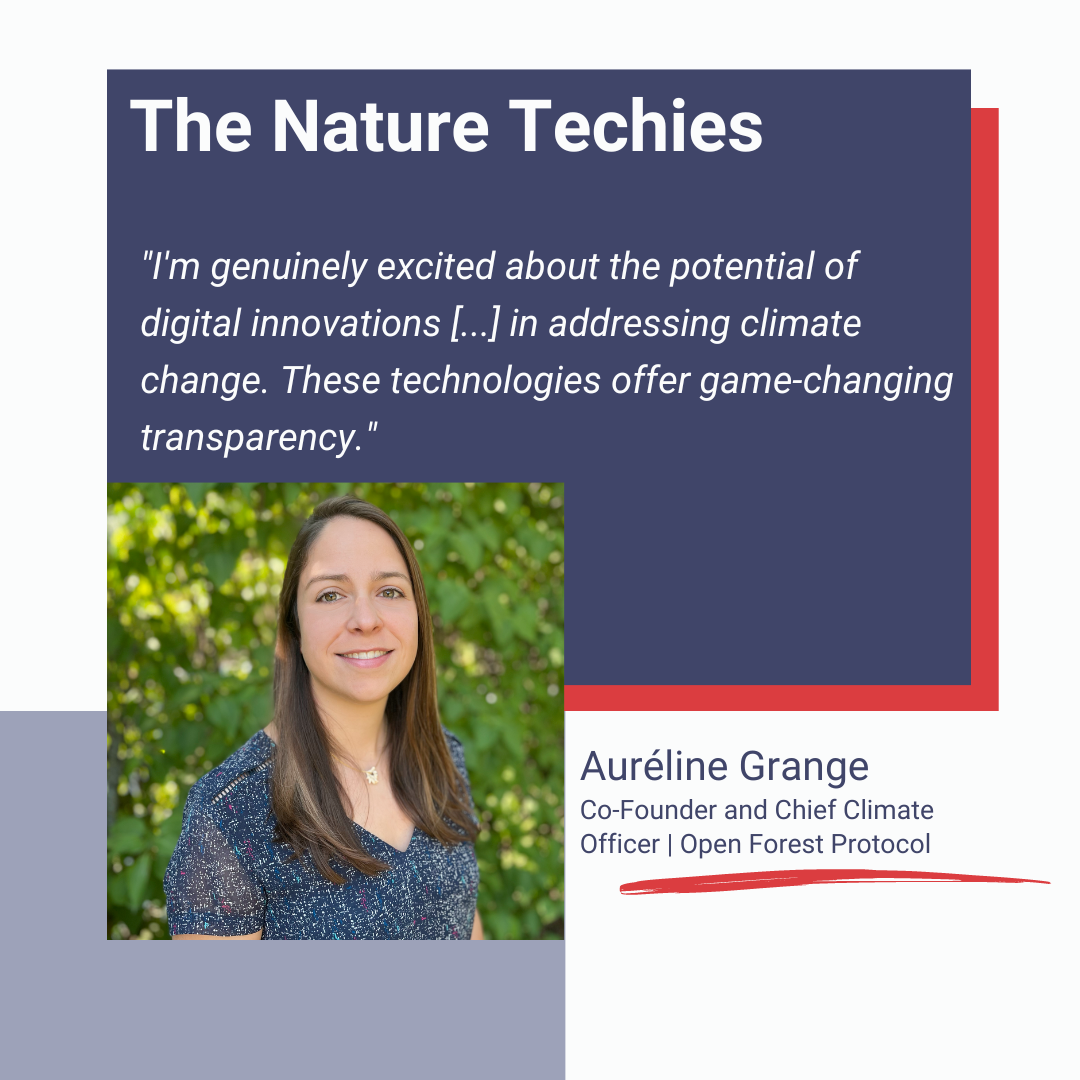
Auréline and her team at Open Forest Protocol have developed scalable, open and transparent monitoring and financing tools to massively scale the restoration of nature and forests especially. These tools are, for instance, now being used by organisations and landowners in the Global South. Some of these landowners used to have no other choice than to deforest their land to get revenue. With Open Forest Protocol, they now have access to an alternative revenue stream based on reforestation and forest protection.
Q: What are you most excited about for digital innovation in 2023 and beyond?
A: “I’m genuinely excited about the potential of digital innovations such as remote sensing, AI, and blockchain in addressing climate change. These technologies offer game-changing transparency and can ensure that funds are directed efficiently to essential nature-based climate initiatives. By meticulously tracking progress and validating results, we are able to ensure utmost accountability and effectiveness. As our planet faces critical challenges, it’s really imperative that we leverage these innovations to scale our efforts, steering us towards a much needed, more sustainable and resilient world.”
Q: What will be the biggest change in the world of digital and the way you work in the next 10 years?
A: “I think in the next 10 years, we’ll see a lot of pressure on humans to use digital innovation and tools to always become more efficient. Hopefully, we’ll be able to remember the irreplaceable value of physical interactions between us and how creative and skilled at problem-solving we are when we work together. I truly believe that balancing the efficiency of digital innovations with the nuances of human interaction will be key to creating a holistic, productive, and fulfilling work environment for us all.”
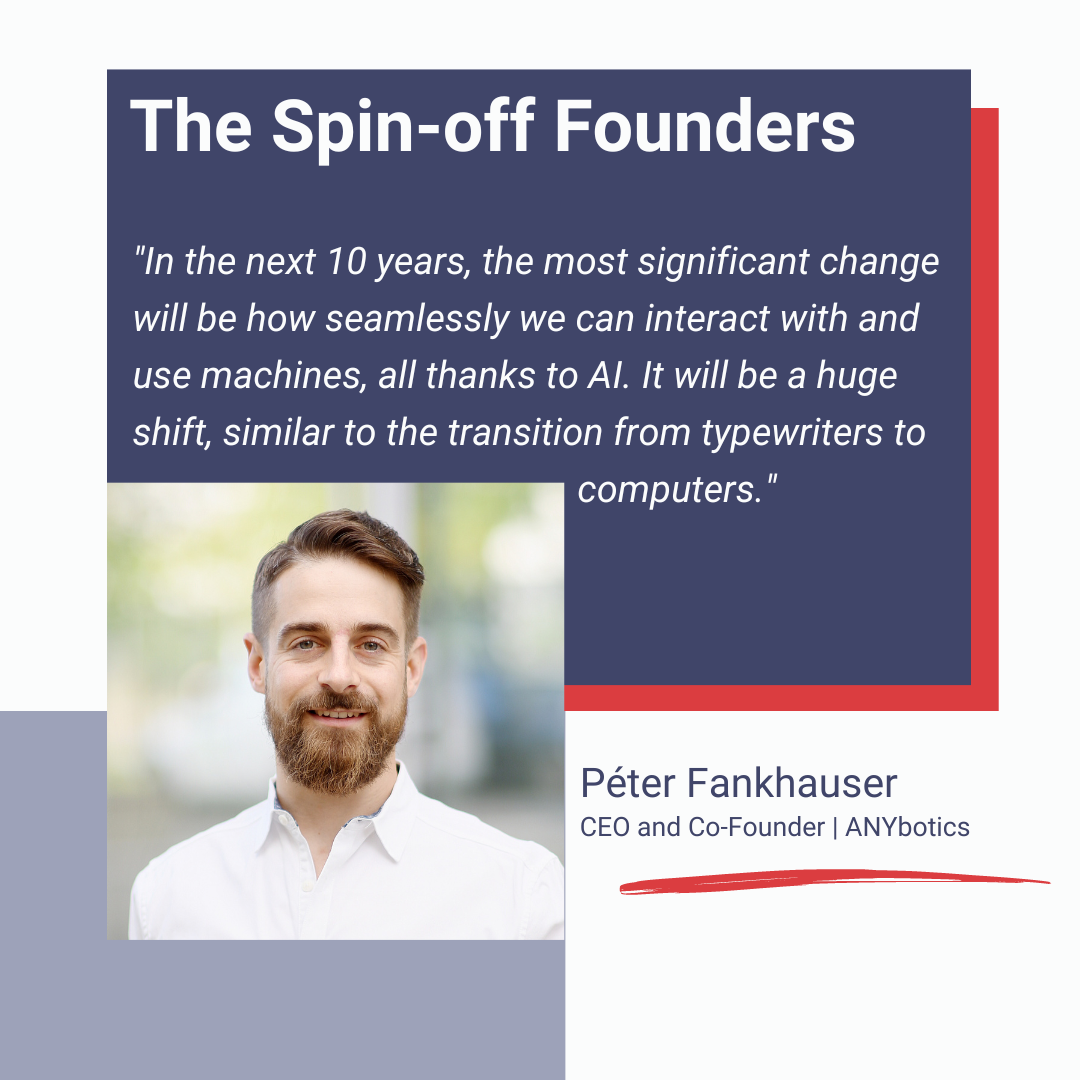
Péter completed his PhD in robotics in 2017, alongside co-founding ANYbotics. Through various roles, including now leading at the front as CEO, Peter is driving impact on a global scale at ANYbotics.
Q: Where do you think Switzerland can make the most impact on the digital innovation stage?
A: “Switzerland’s unique strength lies in blending its history of precision engineering with a strong push in software & AI, backed by our leading universities. This combination creates an ideal environment to transform AI into tangible products, like robotics, addressing pressing global challenges such as workforce shortages and sustainable production.”
Q: What will be the biggest change in the world of digital and the way you work in the next 10 years?
A: “In the next 10 years, the most significant change will be how seamlessly we can interact with and use machines, all thanks to AI. It will be a huge shift, similar to the transition from typewriters to computers.”
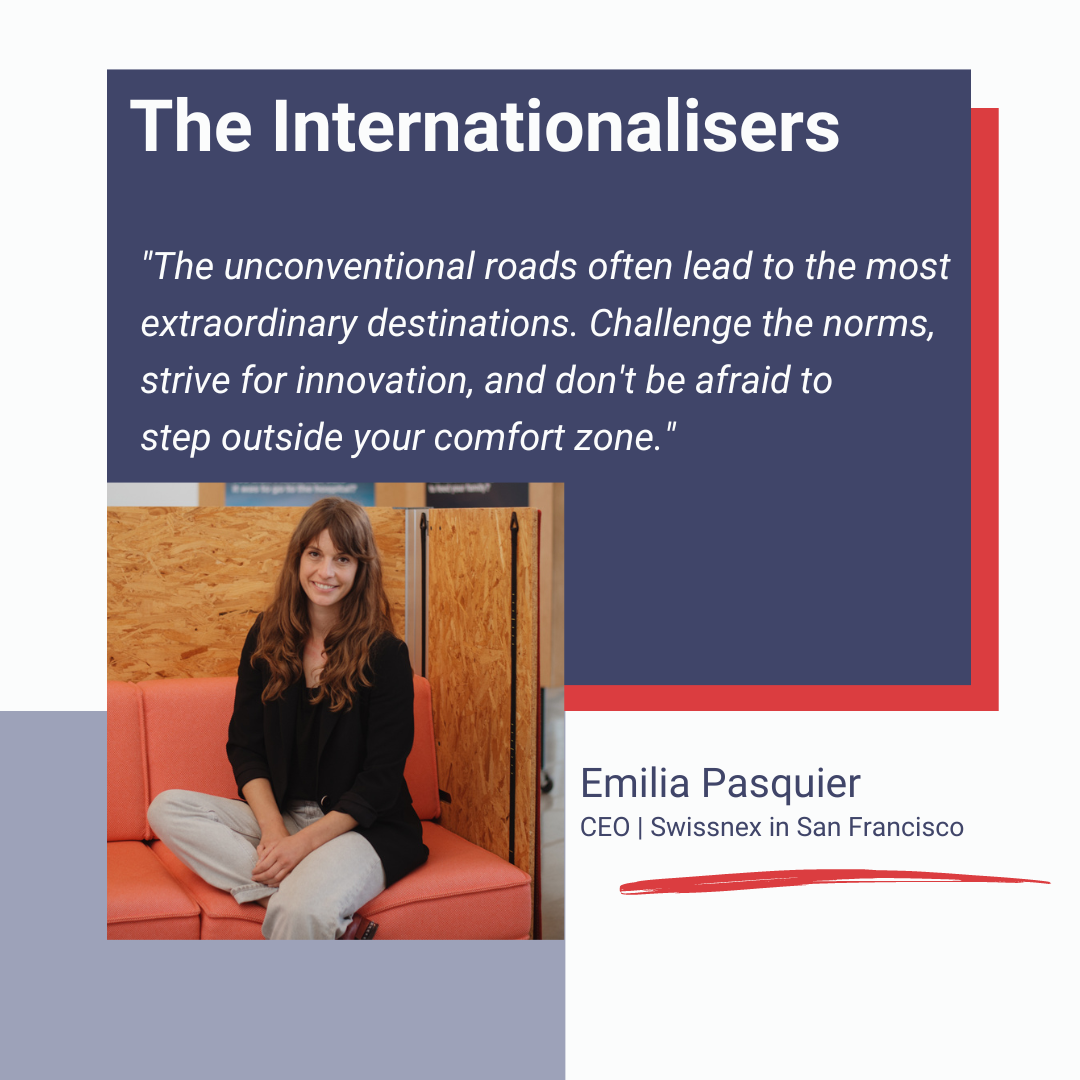
As the CEO of Swissnex in San Francisco, Emilia Pasquier supports Swiss innovators, startups, artists, and academia in exploring or entering the US market by connecting them to key players in the San Francisco Bay Area. With a team of over ten Swiss and American professionals, her overarching goal is to connect Switzerland and the world in education, research, and innovation. Pasquier’s focus is to strengthen Switzerland’s position as a world-leading hotspot of innovation.
Q: If you could give your 16-year-old self one piece of advice (career or life), what would it be?
A: “If I could advise my 16-year-old self, I’d say: be wild, rebellious, and audacious. Embrace the uncharted paths, and don’t fear failure. The unconventional roads often lead to the most extraordinary destinations. Challenge the norms, strive for innovation, and don’t be afraid to step outside your comfort zone, as pushing the boundaries very seldom happens from within them. In both life and career, it’s these qualities that inspire change and drive success.”
Q: Where do you think Switzerland can make the most impact on the digital innovation stage?
A: “Switzerland has the potential to make a profound impact on the digital innovation stage, particularly in the area of health, where we have established considerable knowledge through small and big corporates and are amongst the global leaders. Moreover, Switzerland can impact the space by becoming an international platform for crucial discussions around the ethical use of AI. Building upon the legacy of international Geneva, we can lead dialogues that shape responsible AI governance, thereby ensuring that technology evolves in harmony with human values and global standards.”
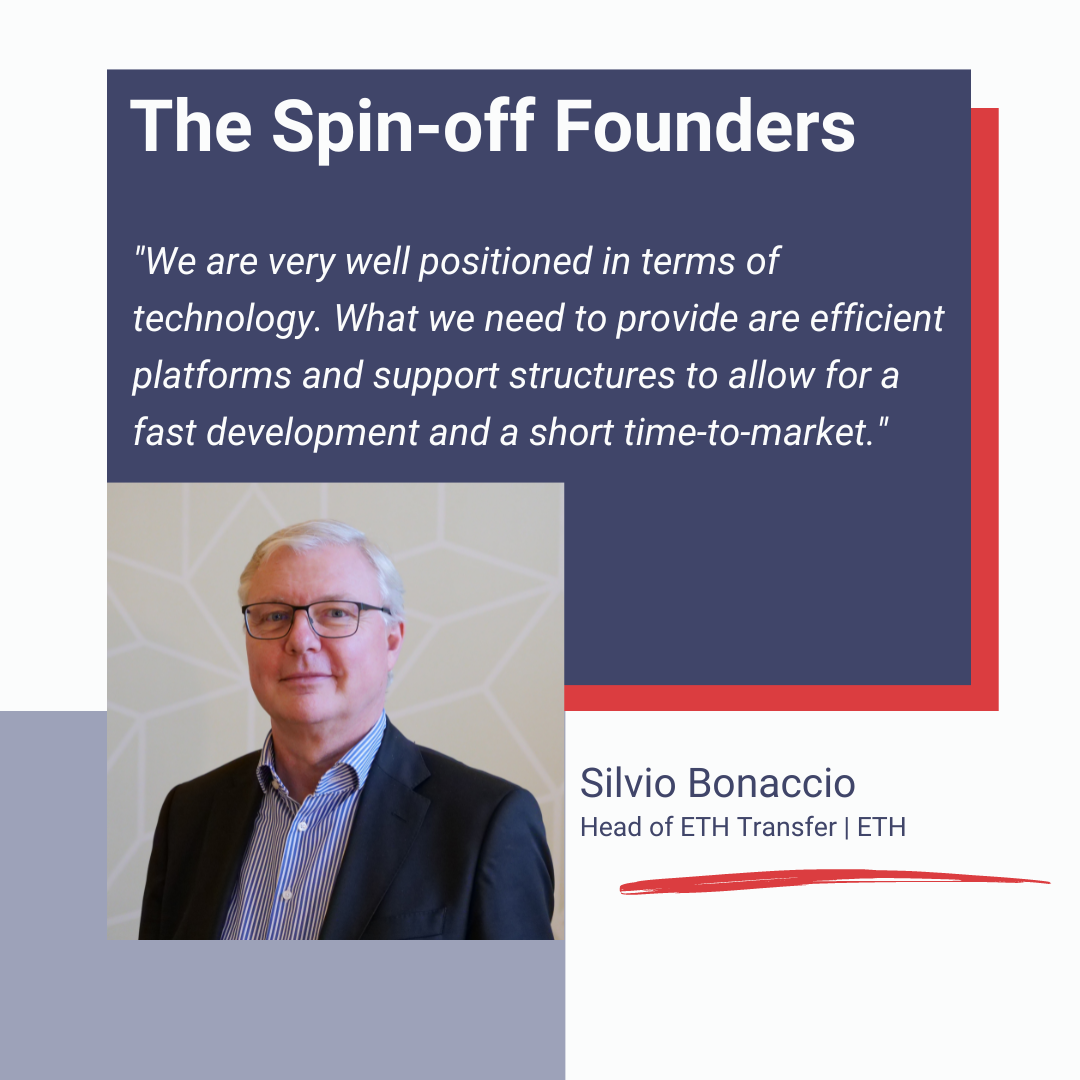
Silvio Bonaccio is one of Switzerland’s most influential people in generating spin-offs. He has led the ETH technology transfer for nearly two decades – spinning off countless companies and encouraging a generation of entrepreneurs.
Q: Where do you think Switzerland can make the most impact on the digital innovation stage?
A: “In Switzerland in general and at ETH Zurich in particular, one finds world leading centres and institutes in many areas, such as information security and privacy, robotics/autonomous systems, AI, visual computing, quantum computing, etc. to name just a few. We are very well positioned in terms of technology. What we need to provide are efficient platforms and support structures to allow for a fast development and a short time-to-market. Then our country will continue to have an impact on the digital innovation stage in various fields.”
Q: What will be the biggest change in the world of digital and the way you work in the next 10 years?A: “The future of augmented reality (AR) changes the way we interact with the digital world and merges the virtual elements with our physical surroundings. This innovation will permeate all areas of life. Already today, our researchers at ETH Zurich are developing products like context-aware AR support for complex operator tasks, hand action prediction or visualisation strategies.”
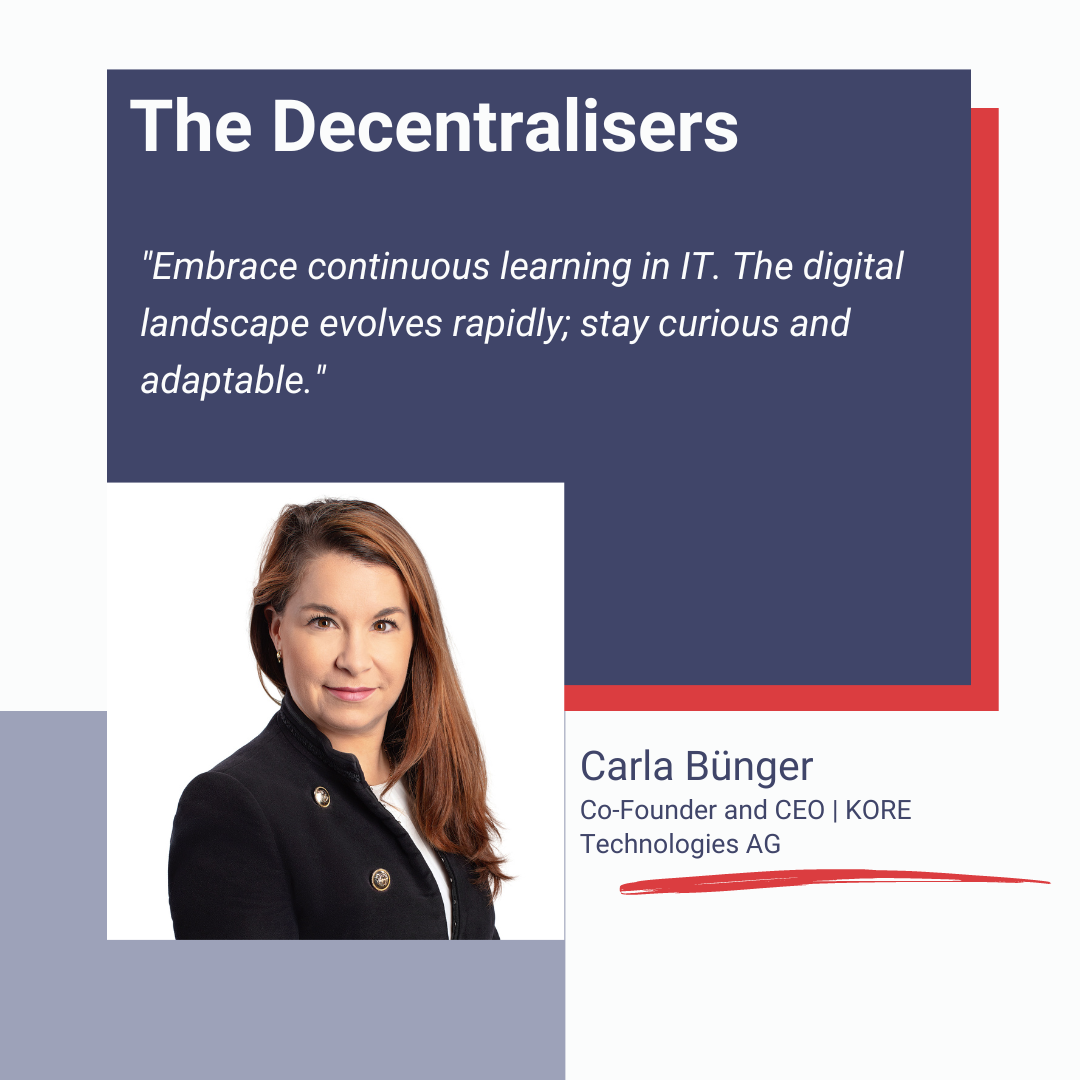
Pushing technological boundaries is in Carla’s blood. Together with her team at KORE Technologies AG, she operates ISO certified blockchain solutions at scale for large corporates like Richemont Group on a global scale. Her company certainly finds solutions for tough problems. Moreover, Carla is an inspirational speaker and motivates people to move into entrepreneurship and tech.
Q: What are you most excited about for digital innovation in 2023 and beyond?
A: “AI and machine learning will revolutionise industries by automating tasks, uncovering insights from vast data amounts that we can not analyse yet and by enabling personalised experiences. This will accelerate innovation in a massive way. This technology holds immense potential to optimise processes, enhance decision-making, and address complex challenges across various domains, transforming the way we work, live, and interact. It’s not just the next buzzword but a deeply impactful development in humanity.”
Q: If you could give your 16-year old self one piece of advice (career or life), what would it be?
A: “Embrace continuous learning in IT. The digital landscape evolves rapidly; stay curious and adaptable. I’d stress the importance of learning coding and computational thinking as well as cybersecurity basics and data analytics. However, what will be important in addition is everything that technology can’t provide: soft skills. The most important being a critical mind to analyse the validity of sources, the ability to take decisions and focus, creative and networked thinking, the skill to express yourself as well as relate, interact and negotiate with one’s environment.”
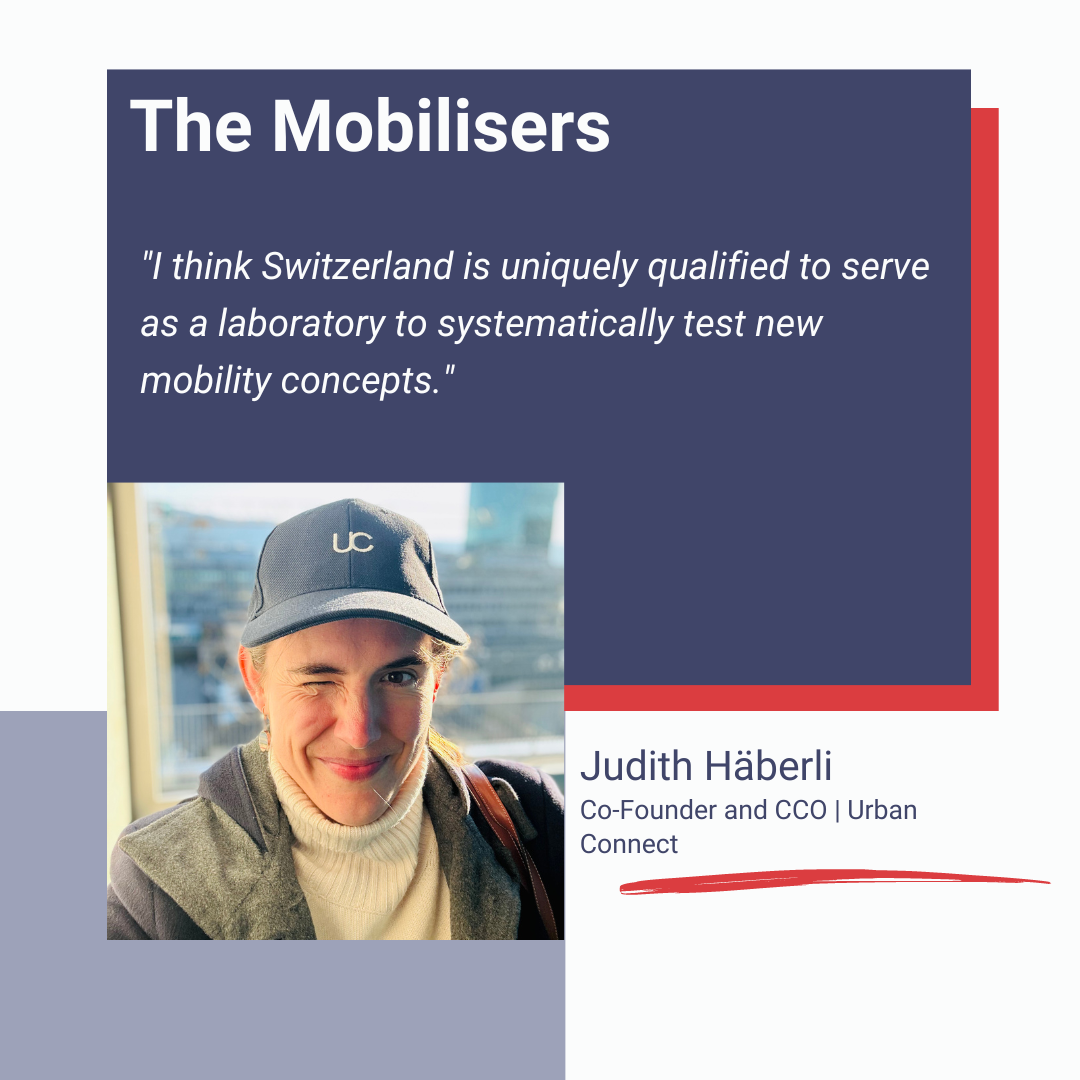
Judith is a mobility expert. She sits on the Advisory Board at the Institute for Mobility at the University of St.Gallen and is Co-Founder of Urban Connect. First as CEO and now as COO, she is finding digital solutions for physical problems.
Q: Where do you think Switzerland can make the most impact on the digital innovation stage?
A: “I think an area that is often overlooked is mobility. And I think Switzerland is uniquely qualified to serve as a laboratory to systematically test new mobility concepts by virtue of its small size, diverse landscape, efficient public transport system, its dense network of roads and railways, its advanced level of digitalisation, and its progressive and pragmatic regulatory approach. So, in short, I think concepts can be tested here before being rolled out systemically in bigger countries with a big impact.”
Q: If you could give your 16-year-old self one piece of advice (career or life), what would it be?
A: “I would tell her to stop trying to fit in and instead approach life with a sense of curiosity, wonder and gratitude. I would tell her that failure is part of progress and no one’s opinion about her should ever matter more than her own. I would tell her that the brain works like a muscle and that she should take on challenges, seek out new experiences and hang out with people that talk about ideas and not about people.”

Matthias has a long history in healthcare digitalisation, including at KS Winterthur and recently at Inselspital Bern. Today, he is driving patient centric collaboration with heyPatient together with his Co-Founder, Regula Spühler.
Q: What are you most excited about for digital innovation in 2023 and beyond?
A: “We’re excited about elevating quality of life with the help of digitally enhanced healthcare systems, transitioning from a sickcare model to a true healthcare paradigm.”
Q: What will be the biggest change in the world of digital and the way you work in the next 10 years?
A: “Digital augmentation will enable a worldwide enhancement to unfold: We will experience healthier environments, better living, and increased equality. In healthcare, new technologies like the digital twin or AI catalyse transformative progress. We will become much more aware of our own health, what we need for our well-being and have information at hand to take an informed decision when it comes to lifestyle changes or starting a medical treatment.”
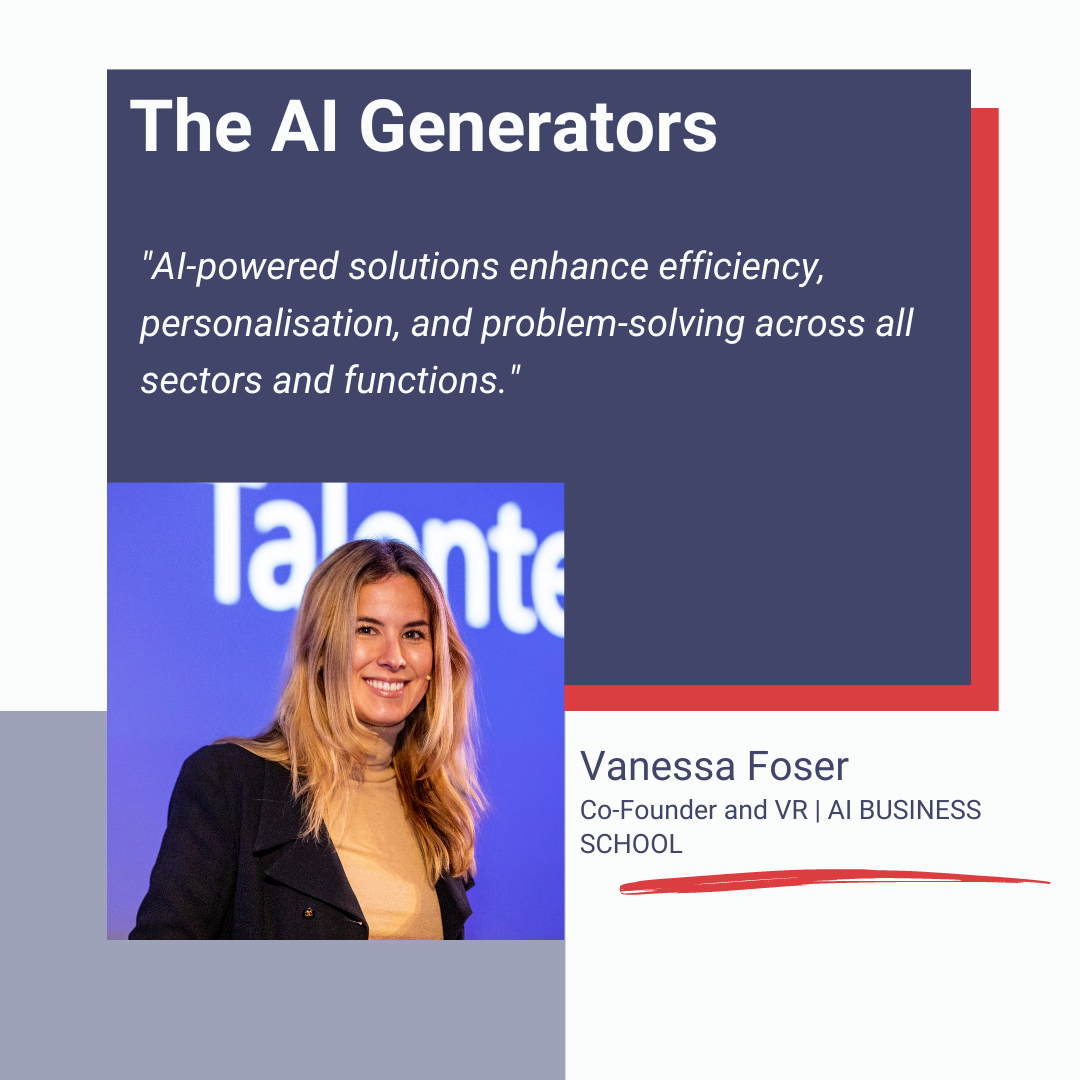
Vanessa Foser is a founder, entrepreneur and board member with a special focus on Artificial Intelligence (AI) and data in combination with innovation, impact and leadership. She supports leading Swiss companies, as well as public institutions, to empower their people on how to make practical use of AI in their daily jobs. Vanessa is also engaged in supporting less privileged people in various countries in getting access to first-class AI education for free, with a special focus on inclusion and diversity.
Q: What are you most excited about for digital innovation in 2023 and beyond?
A: “As an AI-enthusiast/ -pioneer, I am most excited that 2023 stands as the pivotal year when AI’s potential is fully harnessed, driving unprecedented digital progress and revolutionising how we work, communicate, and experience the world. (Generative) AI and digital innovation have converged to define a transformative era. Rapid advancements in machine learning, automation, and data analytics are reshaping industries and everyday life. AI-powered solutions enhance efficiency, personalisation, and problem-solving across all sectors and functions.”
Q: What will be the biggest change in the world of digital and the way you work in the next 10 years?
A: “The next decade will witness a paradigm-shift in the digital world and the way we work. Generative AI-technologies will play a pivotal role in automating even creative and sophisticated tasks, freeing professionals for innovation. The real change lies in our evolving relationship with AI, demanding a culture of digital literacy, encouraging individuals to critically assess the outputs of AI-systems and to intervene when necessary. This synergy ensures AI enhances human capacity, leading to a harmonious coexistence where collective progress thrives.”
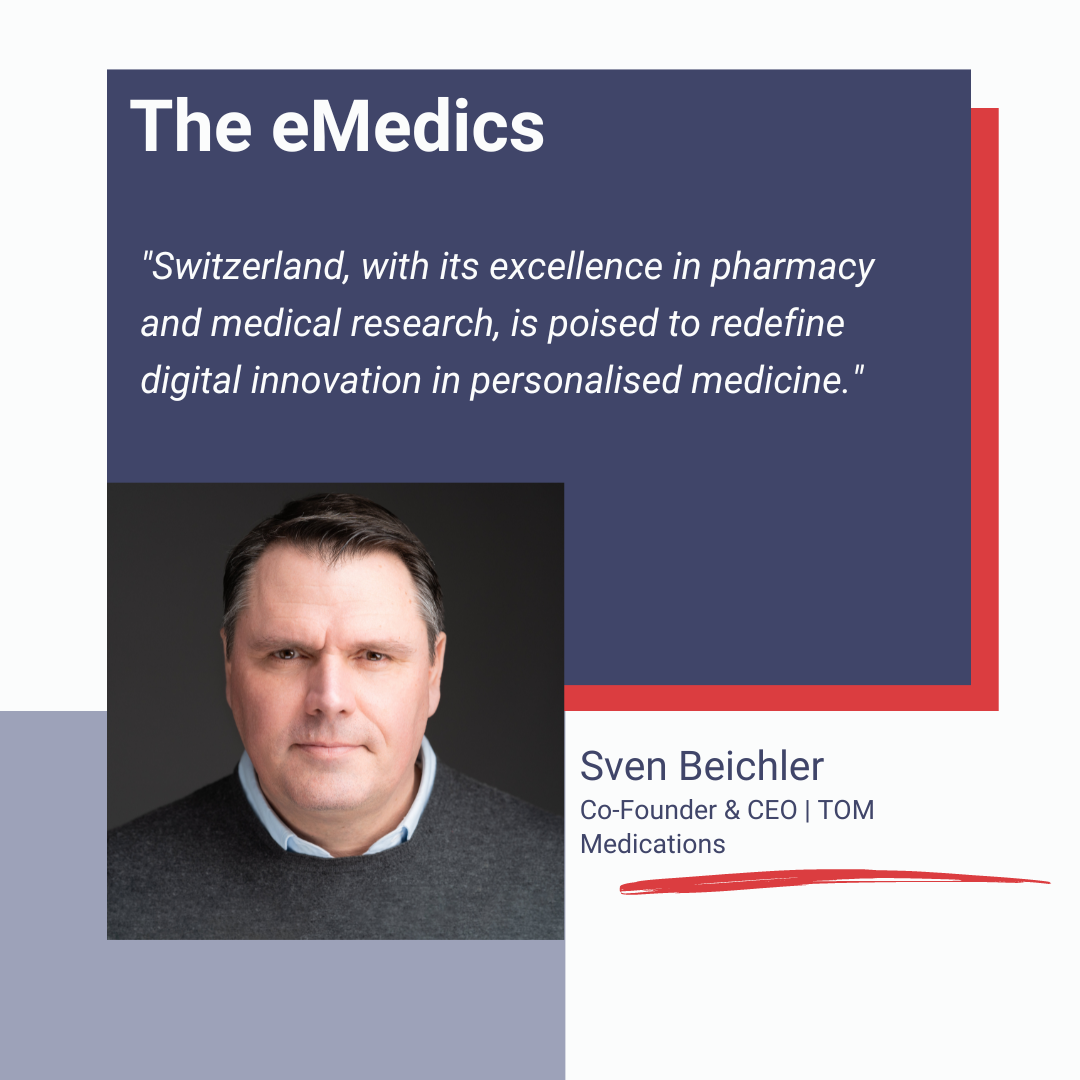
Sven is the Co-Founder and CEO of TOM Medications and has managed to build the fastest growing active community of patients with chronic diseases in Europe in a very short time.
Q: Where do you think Switzerland can make the most impact on the digital innovation stage?
A: “The future of personalised medicine needs data. Switzerland, with its excellence in pharmacy and medical research, is poised to redefine digital innovation in personalised medicine. By integrating data from different health areas and individual health histories, we can gain unparalleled insights. It is critical to disaggregate and share this data, while always respecting regulatory standards, to advance research and care together. This collaborative approach will not only put Switzerland at the forefront of innovation, but also ensure outcomes that benefit individuals.”
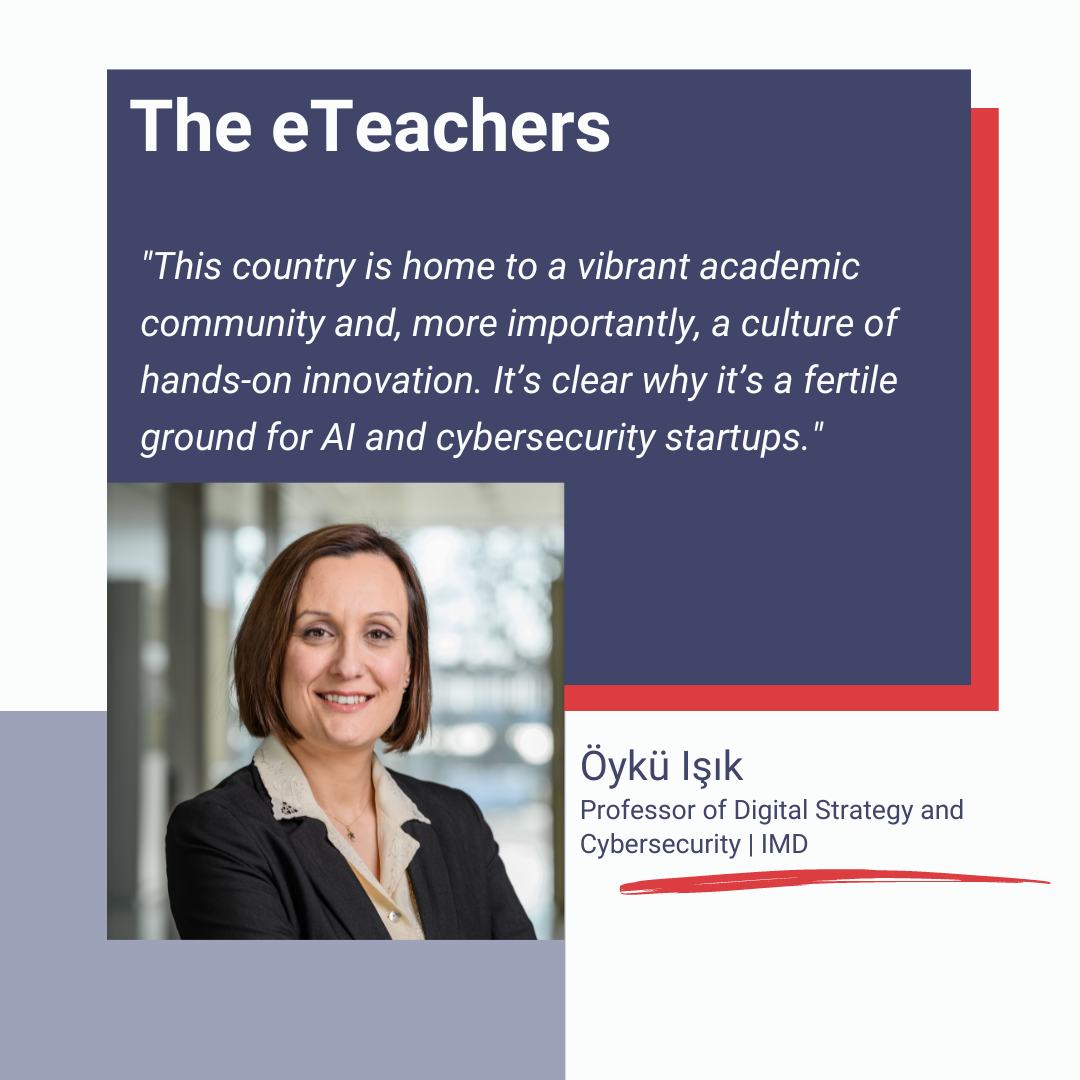
Öykü Işık leads IMD’s Cybersecurity for Managers programme and is an expert on digital resilience and the ways in which disruptive technologies challenge our society and organisations. She helps businesses to tackle cybersecurity, data privacy, and digital ethics challenges, and enables CEOs and other executives to understand these issues, which she believes are too important to be left to technical specialists alone.
Q: Where do you think Switzerland can make the most impact on the digital innovation stage?
A: “I did my PhD in the US because I wanted an international experience, and American universities have that inviting culture that says ‘research’, ‘innovation’ and ‘international collaboration’. But these three years in Switzerland have made me think: ‘why didn’t I come here instead?’ This country is home to a vibrant academic community and, more importantly, a culture of hands-on innovation. It’s clear why it’s a fertile ground for AI and cybersecurity startups.”
Q: What will be the biggest change in the world of digital and the way you work in the next 10 years?
A: I think we’ll have amazing innovations enabled by machine learning and we’re likely to see productivity gains from AI, but I don’t think these necessarily will have a positive impact on our quality of life; I am afraid it won’t make us less overworked. The other aspect is surveillance economy, with social media and data collection: I’m hopeful that the increasing awareness of each new generation, coupled with global regulations, will make the challenge of data privacy better.
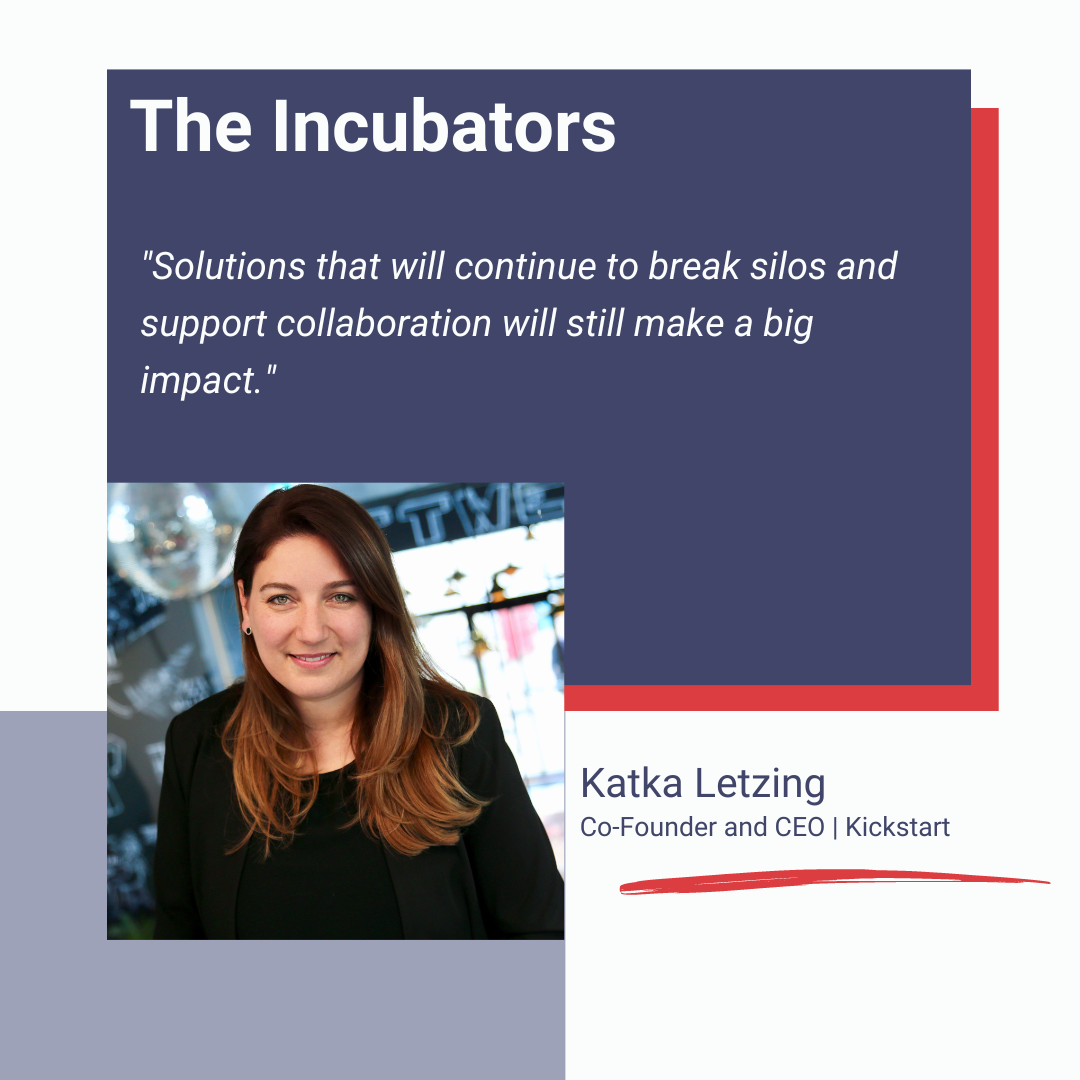
Katka has been involved in innovation projects connected to acceleration and startup development in the USA, Asia and Europe. She was one member of the founding team of Kickstart and since then has helped hundreds of entrepreneurs to grow and startups to scale up within the Kickstart programmes.
Q: Where do you think Switzerland can make the most impact on the digital innovation stage?
A: “I believe that the impact will be driven by topics of deep tech and circular economy as well as artificial intelligence, digital personalised health, robotics, advanced manufacturing, and blockchain – all mentioned technologies are coming out in Switzerland and will influence the productivity and competitiveness of the country.”
Q: What will be the biggest change in the world of digital and the way you work in the next 10 years?
A: “I believe that as we see a shift of co-existing in a hybrid environment, we will see even more data-driven and highly personalised digital experiences that enhance the way how we can see things and make decisions about customer journeys for better engagement and lifetime. That said, solutions that will continue to break silos and support collaboration will still make a big impact.”
Find out more about the jury behind selecting our deserving winners here.






